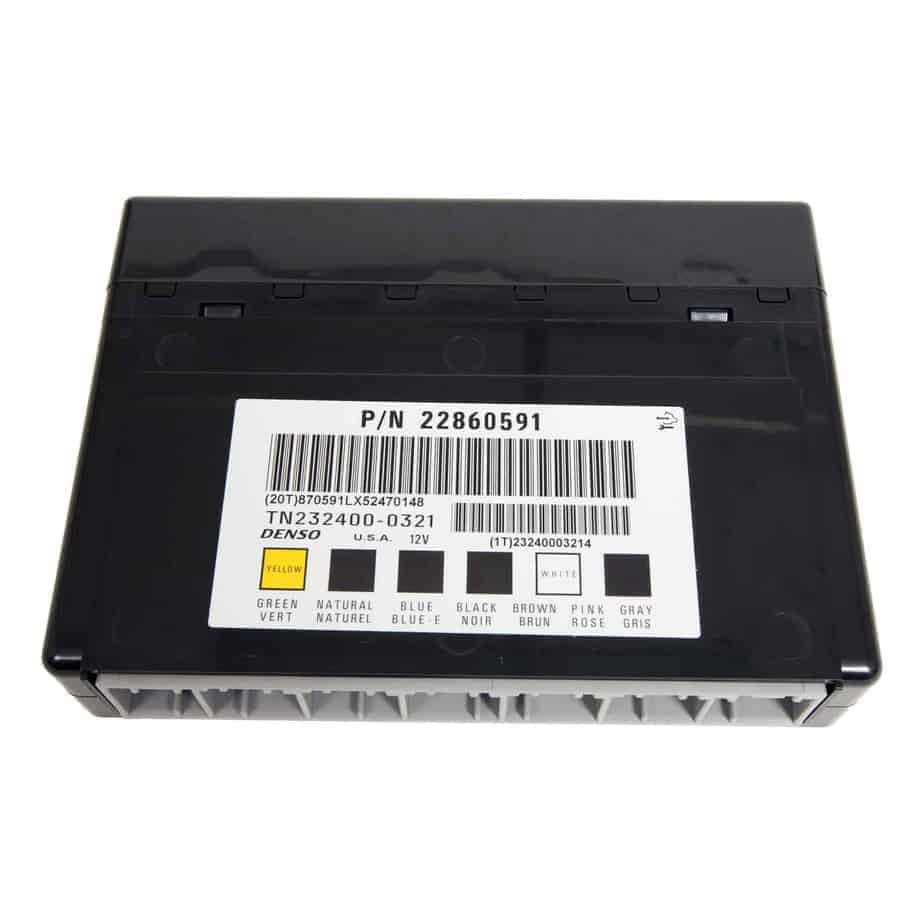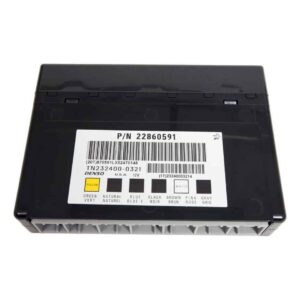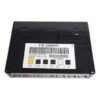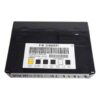Restore Control and End Electrical Frustration
Are you dealing with baffling electrical issues in your GM vehicle? Flickering lights, malfunctioning power windows or locks, a security system that acts up, or a dashboard lit up with random warnings? These aren’t just annoyances; they’re classic signs of a failing Body Control Module (BCM). As the central command center for your vehicle’s body electronics, a faulty BCM can make your car or truck feel unpredictable and unreliable. This isn’t a problem that will fix itself—it typically gets worse over time, potentially leaving you stranded.
This is a direct-fit replacement Body Control Module, a reliable solution designed to restore your vehicle’s factory functions. The biggest challenge with replacing a BCM is the need for expensive dealership programming. We eliminate that step. Simply provide your vehicle’s VIN during checkout, and our technicians will program the module with the latest GM software specifically for your vehicle. It arrives at your door ready for installation, saving you time, money, and a trip to the dealer.
A Technician’s Notebook: The Case of the Haunted Impala
I once had a 2011 Chevy Impala in my bay that the owner swore was possessed. The dome lights would fade in and out while driving, the radio would shut off, and the door locks would cycle randomly. No check engine light, just a constant stream of bizarre behavior. After checking the main grounds and power feeds, my professional scan tool showed multiple ‘Loss of Communication’ codes (U-codes) with various modules. This pointed directly to the BCM, the network’s traffic controller. A failing BCM can’t properly direct data, causing these exact kinds of chaotic symptoms. We swapped in a VIN-programmed BCM, and the ‘haunting’ stopped immediately. This is a fix I’ve performed hundreds of times on various GM platforms.
Common Signs of a Failing GM BCM
If your vehicle is exhibiting these symptoms, a faulty BCM is the most likely culprit. Replacing your 2008 – 2012 GM Body Control Module can resolve these issues:
- ✔ Erratic or non-functional power windows, door locks, and mirrors.
- ✔ Interior or exterior lights that don’t work correctly or stay on.
- ✔ The security system preventing the car from starting (Security light on).
- ✔ Horn sounding unexpectedly or not working at all.
- ✔ Intermittent wiper and washer function.
- ✔ Communication error codes, such as U0140, U0155, or U0100.
- ✔ False warnings on the driver information center (e.g., “Service Stabilitrak,” “Service Airbag”).
Your Straightforward BCM Installation Guide
Installing your pre-programmed BCM is a manageable job for a DIY enthusiast. While the location varies slightly by model, the process is generally the same.
- Safety First: Always disconnect the negative terminal from your vehicle’s battery and wait a few minutes before proceeding.
- Locate the BCM: On most of these GM vehicles, the BCM is located under the driver’s side or passenger’s side of the dashboard, or behind the center console dash panel. A quick search for your specific model will confirm its location.
- Disconnect and Remove: Carefully unplug the electrical connectors from the old BCM. They have locking tabs that need to be depressed. Once disconnected, unbolt or unclip the module from its mounting bracket.
- Install the New Module: Mount your new, pre-programmed BCM in the same location. Securely plug in all the electrical connectors, ensuring they click into place.
- Reconnect and Test: Reconnect the negative battery terminal. Start the vehicle and test all body functions—lights, locks, windows, radio, etc.—to confirm the repair.
Important Post-Installation Information
While our programming handles the critical setup, some vehicle systems may require a ‘handshake’ with the new BCM. This is normal. If you see an airbag light, a ‘Setup SDM Primary Key in BCM’ procedure may be needed with a bi-directional scan tool. Similarly, a ‘Brake Pedal Position Relearn’ might be necessary for certain models. These are simple procedures for any professional shop if required. And remember, there is absolutely no core charge. You can keep your old part.
Will This Fit My Vehicle?
This 2008 – 2012 GM Body Control Module is a direct replacement for a wide array of vehicles and part numbers. Please verify your model and year from the list below. This module is compatible with the following part numbers: 10382479, 15093910, 15276271, 15299986, 15819552, 15828601, 15837419, 15872388, 15872421, 15880684, 15921352, 15921353, 15948438, 15948439, 20815898, 20839063, 20864767, 20864768, 20921435, 20921436, 20935349, 22860591, 25826124, 25826125, 25847588, 25847589, 25892622, 25910474, 25934762, 25934763, and 95151084.
Frequently Asked Questions
How does the VIN programming work?
After you place your order, you will need to provide us with your 17-digit Vehicle Identification Number (VIN). Our technicians use this VIN to load the exact software and vehicle-specific configuration from GM’s database into the module before we ship it to you.
Do I need to send my old BCM back?
No. This product comes with no core charge. You can keep, recycle, or dispose of your old module without any additional fees or hassle.
What tools are needed for the post-installation procedures?
Procedures like the Airbag System Sync or Brake Pedal Position Relearn require a professional-grade, bi-directional scan tool. Most local repair shops have this equipment and can perform these quick recalibrations if needed.
Will this fix my ‘Service Stabilitrak’ message?
In many cases, yes. A failing BCM can disrupt communication on the vehicle’s data network, leading to false error messages from other systems like Stabilitrak or ABS. Restoring proper BCM function often clears these phantom warnings.
What if I install it and some problems remain?
While the BCM is a very common point of failure, ensure you have ruled out other possibilities like bad grounds, wiring issues, or a weak battery. Our pre-programmed BCM provides a solid foundation, but it’s part of a larger electrical system.



